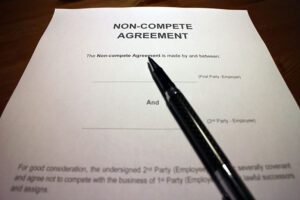 For Shimoda & Rodriguez Law, PC, we have a simple answer when someone calls our California office asking about non-compete clauses or agreements, and it’s that the California Legislature banned them.
For Shimoda & Rodriguez Law, PC, we have a simple answer when someone calls our California office asking about non-compete clauses or agreements, and it’s that the California Legislature banned them.
But where we see non-compete agreements affect employees is at our law offices in Utah, which only applied restrictions to non-compete in 2016.
Employees typically sign such an agreement either at the start of their employment or as a condition of continued employment. Non-compete agreements are usually included as part of an employment contract or a separate agreement signed by the employee.
The Federal Trade Commission (FTC) proposed a new rule in January 2023 that would ban employers from imposing non-competes on their workers nationwide. The FTC estimates that about one in five American workers, roughly 30 million people, are bound by a non-compete clause and are thereby restricted from pursuing better employment opportunities.
The attorneys at Shimoda & Rodriguez Law, PC, have significant experience in Utah non-compete clause cases.
What Is A Non-Compete Clause?
A non-compete clause is a legal agreement between an employer and an employee that prohibits the employee from working for a new employer who is a competitor or engaging in activities that compete with the current/former employer’s business during and/or after a defined period of their employment. This clause is typically included in an employment contract and outlines the specific activities the employee is prohibited from undertaking.
A non-compete clause can also be referred to as a restrictive covenant or non-compete agreement. Other clauses it may be confused with are non-disclosure agreements and employment contracts.
Non-compete clauses are intended to protect the employer’s business interests, such as trade secrets, confidential information, customer relationships, and goodwill. They can be especially important in industries where employees have access to sensitive information or specialized knowledge that could be used to a competitive advantage to the detriment of the employer if the employee were to leave and compete directly against the employer.
Only three states, California, North Dakota, and Oklahoma, have banned non-compete agreements for employees altogether, while other states have imposed specific limitations or requirements.
How Common Are Non-Compete Clauses/Agreements?
Non-compete clauses or agreements are relatively standard in certain industries and job roles, but not all employers require them.
According to a survey conducted by the Economic Policy Institute, approximately one in five U.S. workers (22%) are subject to non-compete agreements — a significant portion of non-competes in professional and technical services, information, finance, and insurance industries.
Non-compete agreements are also more common for higher-wage and higher-skilled workers, including executives, managers, and professionals. For example, a 2018 study found that 14% of workers making less than $40,000 per year were subject to non-compete agreements, compared to 36% of workers making over $100,000 per year.
How Does Utah Enforce Non-Compete Agreements?
Under Utah law, non-compete agreements are only enforceable if they meet certain criteria:
- In writing and signed by the employee and the employer;
- Reasonable in duration and geographic scope;
- Designed to protect a legitimate business interest of the employer;
- Not greater than is necessary to protect the employer’s business interest; and
- Not against the public interest
If a non-compete agreement is found to be enforceable, a court may grant injunctive relief to prevent the employee from engaging in prohibited activities, as well as damages to compensate the employer for any losses resulting from the employee’s breach of the agreement.
It’s important to note that non-compete agreements and state laws are highly fact-specific and dependent on the particular circumstances of each case. Employees should consult an experienced employment law attorney to understand their rights and obligations under Utah law.
What Can Employees Do To Protect Themselves If They’ve Signed A Non-Compete?
If you have already signed a non-compete agreement, there are several steps you can take to protect yourself.
Review the agreement
Carefully review the terms of the non-compete agreement to understand what activities are restricted and for how long. Make sure you fully understand the scope of the agreement and what it means for your future career choices.
Follow the terms of the agreement
While you are still bound by the non-compete agreement, make sure you follow the terms of the agreement. This may include refraining from working for a competitor or soliciting former clients.
Seek legal advice
If you have concerns about the non-compete agreement or if you believe that it may be overly restrictive, it is important to seek legal advice from an attorney like those at Shimoda & Rodriguez Law, PC. An attorney can help you understand your legal rights and may be able to negotiate with your employer on your behalf.
Consider negotiating
Depending on the circumstances, it may be possible to negotiate the terms of the non-compete agreement with your employer. This may involve negotiating a shorter duration for the agreement or a narrower geographic scope.
Focus on building skills
While you are bound by specific rules of the non-compete agreement, focus on building your skills and experience in areas that are not covered by the agreement. This can help you be more marketable when the agreement expires.
Plan for the future
If you are concerned about the impact of the non-compete agreement on your future job mobility and career prospects, start planning for the future. You can also research other industries or geographic locations where the non-compete agreement may not be enforceable and consider developing skills in those areas.
Why Is Non-Compete Topical?
Non-compete agreements have been in the news recently due to a number of factors. One reason is that some states and cities in the U.S. are moving to restrict or ban the use of non-compete agreements in certain industries or for certain types of workers. For example, several states have passed laws limiting the use of non-compete agreements for low-wage employees or in industries such as healthcare, technology, and broadcasting.
Another reason non-compete agreements have been a topic of conversation is the increasing use of these agreements in the gig economy. As more workers engage in freelance or contract work, some employers require them to sign non-compete agreements restricting their ability to work for competitors or in similar fields. This has raised concerns about the impact of non-compete agreements on workers’ ability to earn a living and pursue their chosen profession.
Finally, there have been high-profile cases in which employees and independent contractors have challenged the enforceability of non-compete agreements and have raised questions about the fairness and reasonableness of these agreements. These cases have highlighted the need for employers to carefully craft their non-compete agreements and for employees to understand their rights and options when faced with a non-compete restriction.
Shimoda & Rodriguez Law, PC Has Significant Experience In Non-Compete Agreements
If you signed a non-compete clause and your former employer believes you breached that agreement, we can help. The lawyers at Shimoda & Rodriguez Law, PC have significant experience in multiple areas of state and federal laws meant to protect employees.
Contact an attorney in our office for a free consultation and skilled representation for your case. We provide phone consultations. To speak with an attorney, call us at 833-201-0213 or send our firm an email. We will promptly return all email contacts with a phone call.

